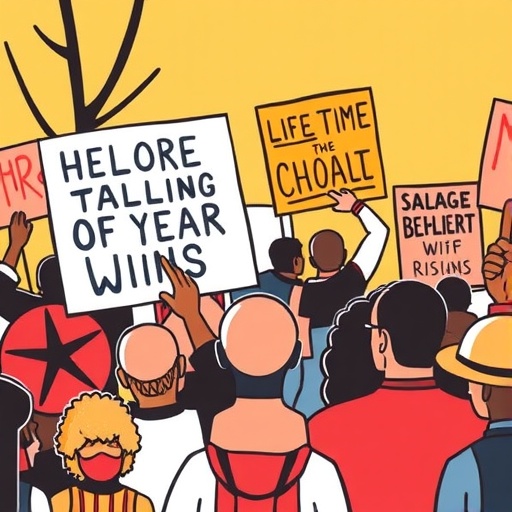In contemporary American discourse, appeals to civil rights language often serve as a cornerstone for advocating social change. However, a groundbreaking new study published in the American Sociological Review challenges the long-standing assumption that framing social issues as civil rights matters inevitably galvanizes broader public support. Contrary to popular belief, the research reveals that such framing might actually diminish backing for government interventions, even among individuals who profess strong support for civil rights ideals.
This extensive research, conducted through surveys involving over 7,500 California voters in 2016 and 2019, scrutinized the nuanced relationship between civil rights rhetoric and public opinion regarding government action on pressing social problems. Participants were not only queried about their abstract attitudes towards civil rights but were also presented with brief narratives depicting individuals facing hardships such as workplace discrimination, food insecurity, or healthcare insufficiency. The critical inquiry focused on whether labeling these hardships explicitly as civil rights issues would enhance or impede participants’ willingness to endorse policy solutions.
The nuanced findings reveal a paradox at the heart of contemporary social advocacy: while Americans overwhelmingly endorse the concept of civil rights in the abstract and recognize its association with equality and protection against discrimination, their support for government intervention decreases when specific social issues are cast in civil rights terminology. This counterintuitive outcome disrupts the prevailing strategic wisdom that civil rights framing universally aids social justice causes.
One essential insight offered by the study relates to the public’s specific conceptualization of civil rights. Respondents overwhelmingly construe civil rights narrowly, primarily as the right to non-discrimination based on immutable characteristics such as race, gender, or religion. This constrained interpretation excludes economic hardships like poverty, hunger, or inadequate access to healthcare from the civil rights domain. Consequently, when activists deploy civil rights frames to describe struggles rooted in economic deprivation, audiences perceive these applications as tenuous or misplaced, undermining the frames’ effectiveness.
Furthermore, the study addresses the issue of group specificity within civil rights framing. Contrary to expectations, framing hardships experienced by particular demographic groups—such as African Americans, Mexican Americans, White Americans, or undocumented Mexican immigrants—as civil rights problems did not yield differentiated increases in support. Instead, the detrimental framing effect was broadly consistent across all beneficiary groups and political subpopulations, including liberals and non-white respondents. Intriguingly, even Black respondents showed reduced support for government interventions when the plight of Black individuals was framed explicitly through civil rights language.
A plausible psychological mechanism underlying these findings involves collective memory and historical resonance. The Civil Rights Movement of the 1960s is deeply engrained in the American consciousness as a moment of heroic collective struggle and monumental social transformation. This idealized memory creates an implicit comparison when contemporary activists invoke civil rights rhetoric. The study suggests that present-day social problems might be unconsciously viewed as less urgent, less heroic, or less morally compelling relative to the monumental battles of the past. This psychological contrast effectively undermines the rhetorical power of civil rights appeals in the current landscape.
From a methodological perspective, the research leverages large-scale survey data with randomized framing treatments, enhancing the rigor and generalizability of its conclusions. By capturing a diverse cross-section of voters and systematically manipulating the framing of social issues, the study elucidates causal relationships between rhetoric and policy support—a significant contribution to sociological and political science literature.
The implications of these findings are substantial for contemporary social movements traversing the political spectrum. Movements ranging from racial justice and immigrant rights to gun control and reproductive rights often rely on civil rights language to galvanize collective action. However, this research signals that such framing may be a double-edged sword, potentially alienating potential supporters or suppressing enthusiasm for government-led solutions.
In light of these challenges, the study’s authors propose alternative rhetorical strategies that may prove more fruitful. One promising approach is the invocation of “American values” rather than direct civil rights rhetoric. This frame foregrounds shared national ideals such as fairness, equality of opportunity, and respect for individual dignity, without eliciting direct comparisons to the revered Civil Rights Movement. Early evidence from the surveys suggests this values-based framing resonates more broadly and fosters greater public endorsement of policy interventions.
The study’s findings encourage social advocates and policymakers to rethink communication strategies in fostering social change. Rather than relying on the historical resonance of civil rights language, crafting messages that connect contemporary challenges to widely held American ideals may engender a more unifying and motivating discourse. Such reframing could mitigate cultural and political divisions, expanding the coalition of supporters for progressive social policies.
Importantly, this research also challenges scholars and activists to assess how historical narratives shape present-day political attitudes. The enduring symbolic weight of the Civil Rights Movement, while a source of pride and identity, may paradoxically inhibit the urgency attributed to current social struggles when framed in its likeness. This insight invites a deeper interrogation of how collective memory interacts with political persuasion and social mobilization in modern democracies.
Overall, the study "Frame Backfire: The Trouble with Civil Rights Appeals in the Contemporary United States" offers a paradigm-shifting analysis that reframes the discourse on civil rights rhetoric. By highlighting the unexpected backfire effects of civil rights framing and proposing viable alternatives grounded in shared values, the research provides vital guidance for those seeking to navigate the complexities of public opinion and advocacy in a polarized society.
Subject of Research: People
Article Title: Frame Backfire: The Trouble with Civil Rights Appeals in the Contemporary United States
News Publication Date: 16-May-2025
Web References: http://dx.doi.org/10.1177/00031224251333087
References: American Sociological Review article (DOI: 10.1177/00031224251333087)
Keywords: Activism, Sociology, Social inequality, Social movements




